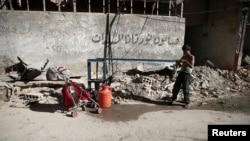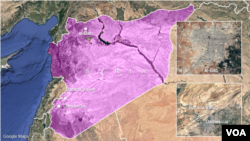Syrian monitors say hundreds of civilians fled villages outside the Syrian capital Sunday, as fighting continued for a third straight day between government forces and several rebel groups that include al-Qaida-linked jihadists excluded from last week's cease-fire declaration.
The exodus from the Barada Valley, also reported by the Damascus government's official news agency, is said to involve about 1,300 people seeking safety from airstrikes and artillery shelling by the Syrian military and its Russian allies.
Monitors from the Syrian Observatory for Human Rights provided no tally of airstrikes or casualties on Sunday. But Saturday, the observatory said the area had been struck multiple times since Friday, with 10 separate strikes alone in a brief period Saturday morning.
The fighting comes despite a truce brokered by Russia, Syria and Turkey that took effect early Friday and is said to be largely holding in other areas of the war-ravaged country.
That truce declaration excluded the Barada Valley, where al-Qaida-linked jihadists from the former al-Nusra Front are reported interspersed with rebels seeking to topple the government of President Bashar al-Assad.
Water shortages
The valley's Barada river is the primary source of water for Damascus and its surrounding area, and the new fighting is said to coincide with severe water shortages in the capital first reported December 22. The government has accused rebels of contaminating water supplies with diesel fuel, forcing severe rationing in Damascus and heightening a sense urgency by the government to clear the region of rebel forces.
For their part, rebel groups dug in at Barada since 2012 linked the contamination to government airstrikes they claim heavily damaged a key water processing facility that supplies the city.
The truce agreement that took effect Friday is the first cease-fire initiative in the Syrian civil war that does not involve the United States or the United Nations.
The deal came two weeks after Syria and its Russian allies declared victory in the northern city of Aleppo, after a months-long air offensive that saw Russian and Syrian warplanes destroy the rebel-fortified eastern sector of the city. In the last days of the siege, Russia-backed Syrian ground forces pushed through the sector, cutting it in half and forcing rebels out.
Analysts say the victory strengthened the Syrian president's hand as warring parties in the multi-sided conflict prepare for peace talks in late January in the Kazakh capital of Astana.







